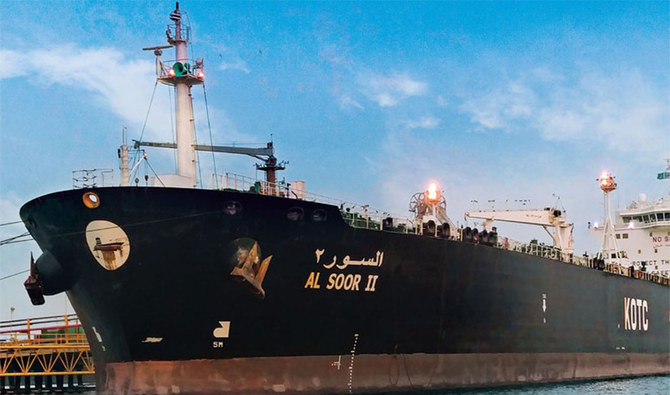KARACHI: A Kuwaiti oil tanker carrying a shipment of ultra-low sulfur diesel (ULSD) for Pakistan State Oil (PSO), the oil marketing arm of the government, is due to arrive at Port Qasim in the Pakistani megalopolis of Karachi on Tuesday evening, PSO said.
ULSD is diesel fuel with substantially lowered sulfur content. Pakistan has said all diesel imports of the country will conform to Euro-V standards by January 2021, which specifies a maximum of 50 parts per million of sulfur in diesel fuel for most highway vehicles.
Pakistan imports around 70 percent crude oil from Saudi Arabia and the rest from Abu Dhabi, while finished products are imported mainly from Kuwait and UAE.
PSO recently launched its Euro-V standard high speed diesel under the brand name “PSO Hi-Cetane Diesel Euro 5.”
“Recently, only one cargo of 41,000 MT of ULSD has been imported by PSO from Kuwait Petroleum Corporation on December 23, 2020,” PSO said in a statement to Arab News. “Arrival of next shipment is expected on January 5, 2021.”
According to Marine Traffic which tracks the movement of ships, the second shipment to Pakistan on board Al-Salam-II, owned by the Kuwait Oil Tanker Company, is scheduled to arrive at the outer anchorage of port Qasim on January 5.
PSO officials said they had completely switched their diesel imports to Euro-V from January 1, 2021.
“All imports of diesel will consist of Euro-V standard only,” Syed Muhammad Taha, CEO and Managing Director of PSO, said on Monday. “We have a long-term agreement with the Kuwait [for import of diesel]. We have around a 47 year-long agreement with Kuwait.”
“Pakistan is a strategic market for KPC as Kuwait is considered the largest supplier of diesel to Pakistan’s market,” the Kuwait Petroleum Corporation said in a statement on Friday.
Pakistan meets 30-40 percent of its diesel demand from imports while remaining demand is met through local production.
“The domestic demand of diesel is around seven million tons, of which four million to 4.5 million ton is locally produced while rest is imported,” Dr. Nazar Abbas Zaidi, former Secretary of Oil Companies Advisory Council (COCAC), told Arab News.
At present only National Refinery, out of Pakistan’s five refineries, produces Euro-V standard while others produce Euro-II diesel products to meet 60-70 percent of country’s demand. The National Refinery started production of high-speed diesel (HSD) with Euro-V specifications from January 1, 2021.
“Others [refineries], if they start work on the upgradation now, will take minimum two years,” Aftab Hussain, Former CEO of Pakistan Refinery, told Arab News.
In August 2020, the government introduced penalties for refineries who failed to produce products that didn’t meet Euro-V specifications. Refineries have opposed the government move, terming it arbitrary.
















